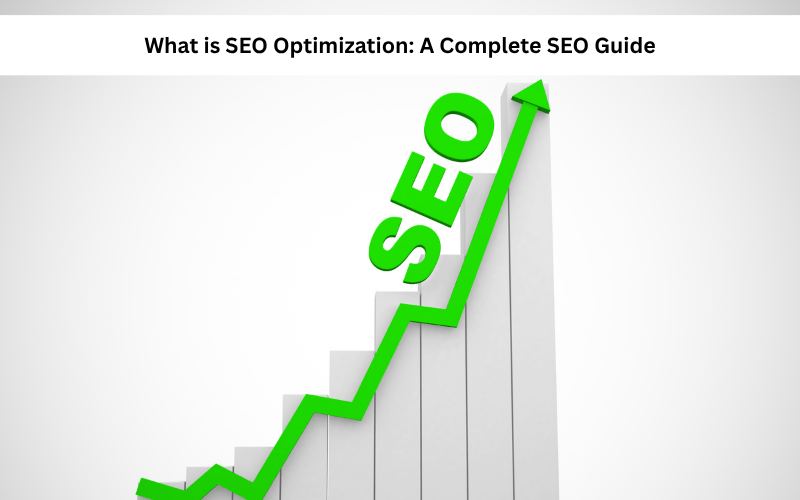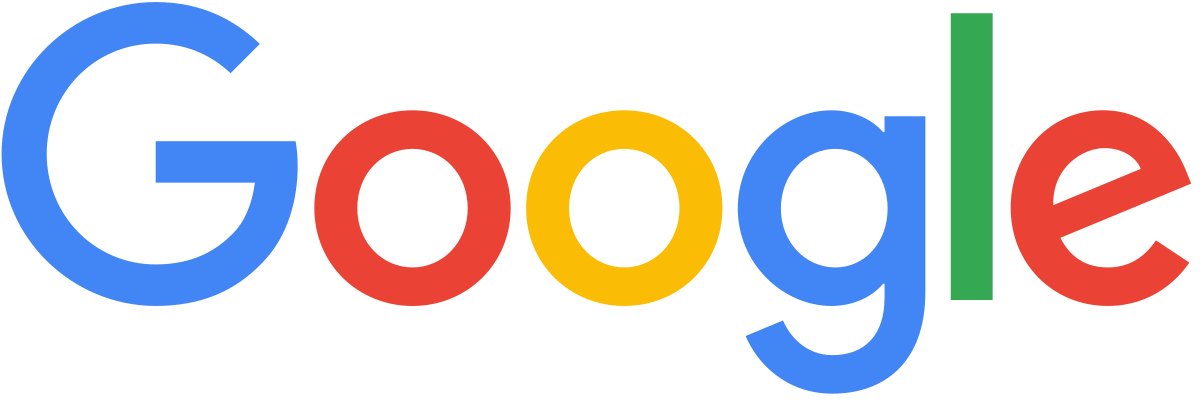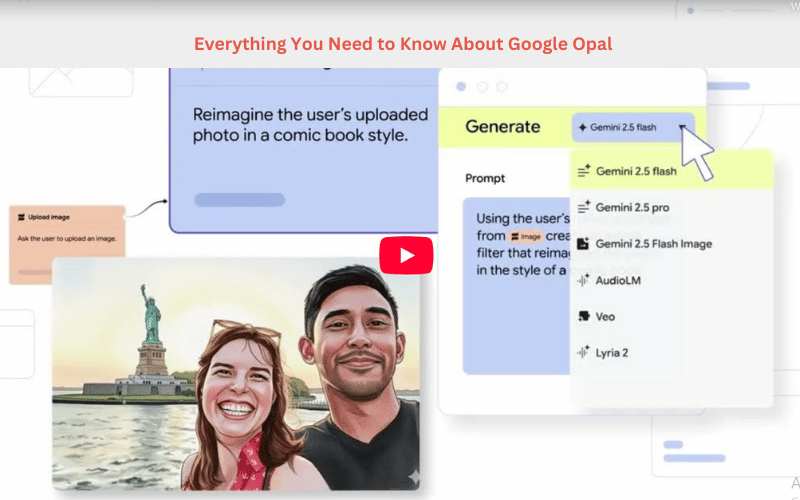Businesses and websites must leverage every tool to improve their online visibility. One of the most powerful tools in any digital marketing strategy is SEO optimization. SEO, or Search Engine Optimization, plays a pivotal role in determining how your website ranks on search engines like Google. But what is SEO optimization, and why is it crucial for your online success?
What is Search Engine Optimization?

SEO optimization involves a series of strategies aimed at increasing the visibility of your website in organic search results. It’s not just about selecting the right keywords, but also ensuring that your site provides a smooth user experience, high-quality content, and meets the technical requirements that search engines favour.
Whether you’re looking to improve SEO marketing, craft a comprehensive SEO marketing plan, or boost rankings using advanced techniques, understanding the fundamentals is key. This guide dives deep into SEO strategy, addressing critical aspects such as LSI SEO strategy, how SEO works, and what it takes to thrive in a competitive digital marketplace.
Moreover, as businesses continue to shift toward digital dominance, the need for expert insights has never been greater. For businesses in Montreal, consulting with an SEO expert in Montreal or an SEO company in Montreal can help tailor strategies to meet local and global SEO needs. Join us as we explore SEO techniques and discover 10 proven strategies to boost SEO that can elevate your business’s online presence.
SEO is not just a buzzword – it’s the backbone of a successful digital marketing approach, and this guide will help you navigate the ever-evolving landscape of search engine optimization in digital marketing.
1. Crawling, Indexing, and Crawl Budget: The Heart of SEO

A website’s crawl budget is one of the most important technical aspects of SEO. Crawling is the process by which search engines like Google scan and discover pages on your website. However, it’s essential to focus on optimizing this process to ensure Googlebot spends its time wisely. This becomes increasingly important for large websites with hundreds or thousands of pages.
-
Crawl Budget Optimization

Additionally, implementing robots.txt correctly is crucial to instruct Googlebot on which pages to crawl and which to avoid. By optimizing your crawl budget, you can ensure that Googlebot is indexing your most valuable content, improving your chances of ranking well.
-
Indexing: Ensuring Proper Indexing of Critical Pages
Once your pages are crawled, they need to be indexed to appear in search results. It’s essential to ensure that your website is free of indexing issues, such as using noindex tags for pages that shouldn’t appear in search results. To check if your pages are being indexed properly, use Google Search Console’s Index Coverage report.

Moreover, indexed pages should reflect the most important content on your site. For e-commerce websites, for example, pages like product descriptions, user reviews, and category pages should be indexed to ensure they rank well. Canonical tags can help manage duplicate content and ensure that search engines know which version of a page should be indexed.
2. Core Web Vitals: A Key Ranking Factor

As of 2021, Google started using Core Web Vitals as part of its ranking algorithm. These metrics assess how users experience a page in terms of speed, responsiveness, and visual stability. Ignoring Core Web Vitals can significantly affect your SEO rankings.
Google’s Core Web Vitals are a set of performance metrics that directly impact user experience and SEO rankings. Among these, three key metrics—Largest Contentful Paint (LCP), First Input Delay (FID), and Cumulative Layout Shift (CLS)—serve as critical indicators of how users perceive the speed and interactivity of a website.
-
Largest Contentful Paint (LCP)
LCP measures the time it takes for the largest visible element (usually an image, video, or block of text) to load on the page. This metric is crucial because it directly influences how quickly users perceive a page to be ready for interaction. Ideally, LCP should occur within 2.5 seconds or less. To improve LCP, webmasters can focus on optimizing images by reducing file sizes or using modern formats like Webp, leveraging browser caching, and reducing JavaScript execution time. A fast LCP creates a seamless browsing experience, keeping users engaged. An SEO expert in Montreal can provide tailored strategies to enhance your website’s performance and ensure a faster LCP, which ultimately helps improve user experience and search rankings.
-
First Input Delay (FID)
FID tracks the time it takes for a page to become interactive after the user clicks or taps on it. Essentially, it measures the responsiveness of the page. A low FID, ideally under 100 milliseconds, ensures that the user can start interacting with the page without noticeable delay. High FID can be caused by heavy JavaScript execution or other resources that block the main thread. To reduce FID, developers should focus on optimizing JavaScript, deferring non-essential scripts, and minimizing the use of third-party scripts that might slow down the page’s responsiveness.
-
Cumulative Layout Shift (CLS)
CLS gauges the visual stability of a page during its loading process. If elements on the page shift unexpectedly, it can cause frustration, especially when users are about to click a button or interact with a form. A good CLS score is below 0.1, ensuring a stable page layout as it loads. To minimize CLS, webmasters should allocate space for dynamic content such as images, ads, and embedded elements. Setting dimensions for images and using fixed space for ads can prevent elements from shifting unexpectedly, improving overall visual stability and user satisfaction.
Focusing on these three Core Web Vitals—LCP, FID, and CLS—ensures that your website is fast, interactive, and visually stable, enhancing user experience and boosting digital marketing in Montreal performance.
3. Off-Page SEO: Authority Building Beyond Backlinks

While backlinks continue to be a fundamental factor in off-page SEO, there are several advanced strategies that can significantly enhance your website’s authority and search engine rankings. Among these strategies, social proof, brand mentions, and local SEO optimization play key roles in establishing a website’s credibility and visibility. An SEO expert in Montreal can help you leverage these advanced techniques to boost your website’s authority, improving your search engine rankings and overall online presence.
-
Social Proof and Brand Mentions
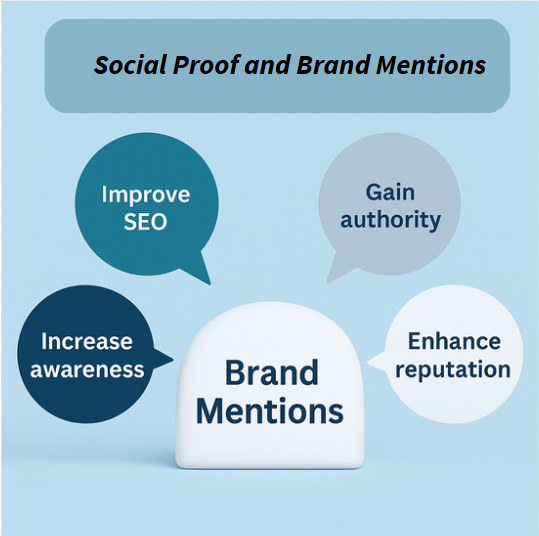
Social proof has become an essential factor in SEO as Google increasingly values brand mentions, even when they don’t include an actual backlink. A brand mention refers to any instance where your brand name is discussed online, regardless of whether a link to your website is included. These mentions are a signal to Google that your brand is gaining traction and authority in your niche. Understanding this evolving dynamic is key to grasping the modern SEO marketing definition, which now extends beyond just keywords and backlinks to include reputation and user engagement signals.
-
Google My Business (GMB), Google Business Profile (GBP) and Local SEO
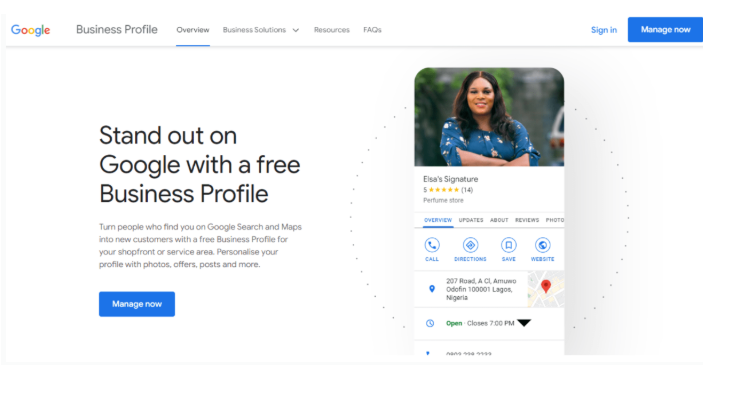
For businesses targeting specific geographic locations, such as Montreal and its surrounding areas, local SEO is crucial. One of the most effective ways to improve your local SEO is by optimizing your Google My Business (GMB) profile. A complete, accurate GMB profile helps your business appear in local search results, improving visibility among potential customers. Ensure that your profile includes up-to-date information such as contact details, business hours, location, and high-quality photos. This approach aligns with the broader concept of search engine optimization in digital marketing, where local SEO and customer engagement play a pivotal role in driving traffic and enhancing brand credibility.
4. SEO Tools for Optimizing Your Website: On-Page, Off-Page, and Technical Strategies
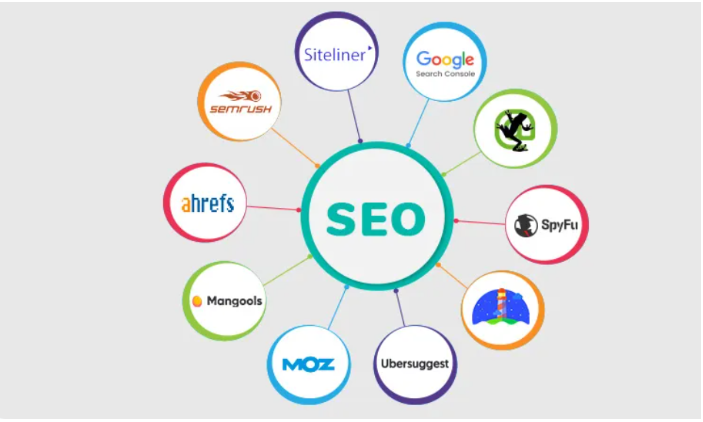
On-page SEO tools are essential for ensuring that your content is optimized for search engines. Here are some of the best tools for optimizing on-page SEO:
-
On-Page SEO Tools
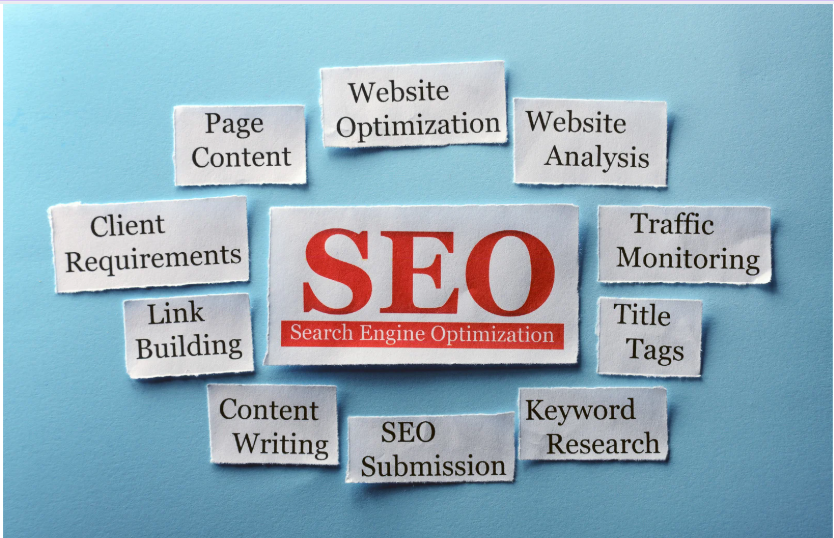
- SEMrushSEMrush is a powerful SEO tool that helps you with keyword research, competitive analysis, and on-page optimization. It provides in-depth data for optimizing title tags, meta descriptions, header tags, keyword density, and more. SEMrush’s On-Page SEO Checker tool also provides actionable recommendations to improve the SEO of specific pages.
- Surfer SEOSurfer SEO analyzes over 500+ factors related to on-page SEO and offers suggestions for improving your content, such as keyword optimization, content structure, and meta tags. It’s particularly valuable for those looking to implement SEO best practices based on top-ranking pages for a given keyword.
- ClearscopeClearscope is an advanced content optimization tool that focuses on keyword and content optimization. It helps you identify related terms and phrases, ensuring that your content is comprehensive and relevant to the target audience’s search intent. Clearscope is great for improving the depth and relevance of your content.
- MarketMuseMarketMuse uses AI to analyze your content and provide recommendations for improving your on-page SEO. It helps you enhance content relevance, keyword usage, and the overall quality of your copy. It’s excellent for discovering content gaps and improving content comprehensiveness.
- Surfer SEOThis tool is similar to SEMrush but with a deeper focus on how your content compares to competitors. Surfer SEO offers a detailed on-page audit and helps refine keyword usage while considering all SEO elements such as word count, keyword density, and headers, making it a valuable tool for digital marketing in Montreal to gain a competitive edge.
- Page Optimizer ProPage Optimizer Pro is another tool that focuses on optimizing individual pages based on the competitive landscape for a keyword. It provides actionable insights into how to improve various on-page factors to get the best ranking for your target keywords.
-
Off-Page SEO Tools
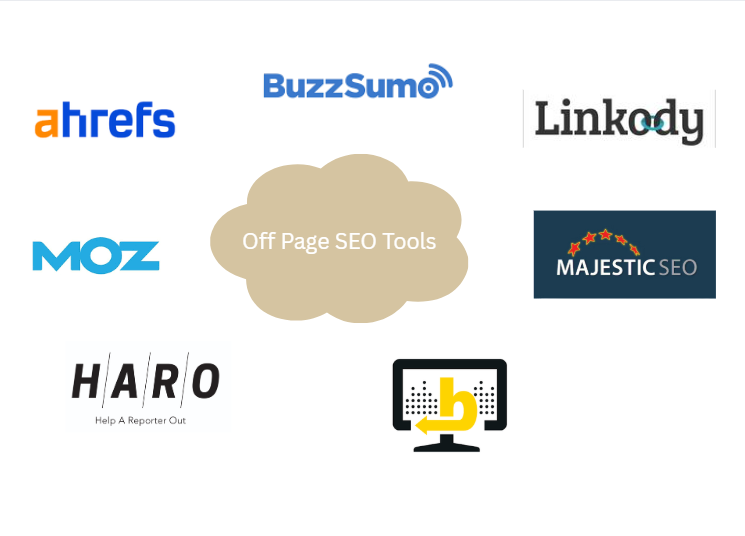
Off-page SEO plays a vital role in building domain authority, generating backlinks, and improving online visibility. Here are the tools that can help you enhance your off-page SEO strategy with the guidance of an SEO expert in Montreal to ensure your website stays ahead of the competition.
- AhrefsAhrefs is one of the most popular tools for off-page SEO, providing insights into backlinks, competitors, and domain authority. It helps you discover link-building opportunities, analyze competitor backlink profiles, and track the performance of your backlinks over time.
- MozMoz is a comprehensive SEO toolset, particularly well-known for its link-building and domain authority analysis tools. It includes features like Link Explorer and MozBar that allow you to research backlinks, track competitors, and monitor your site’s SEO health.
- BuzzSumoBuzzSumo is perfect for content research and analyzing how content performs across the web. It helps identify influencers in your niche, find trending topics, and track content performance. It’s particularly useful for discovering content that is most likely to attract backlinks and social engagement.
- LinkodyLinkody is a backlink management tool that helps you track the quality and health of your backlinks. It simplifies the process of monitoring your link-building efforts and provides insights into whether your backlinks are still live or have been removed.
- MajesticMajestic offers comprehensive backlink analysis tools and is known for its focus on link-building data. It helps you monitor your website’s backlinks, analyze competitors’ link profiles, and assess your site’s domain authority and trust flow.
- HARO (Help A Reporter Out)HARO is a great tool for acquiring backlinks through media coverage. You can respond to journalists’ queries with relevant information, and if your response is featured, you’ll gain a valuable backlink. It’s particularly helpful for getting authoritative backlinks from trusted publications.
- Monitor BacklinksThis tool helps you track your backlink profile and offers features such as link quality scoring, anchor text analysis, and competitor backlink comparison. It is excellent for identifying new backlink opportunities and ensuring that your backlink profile remains healthy.
-
Technical SEO Tools
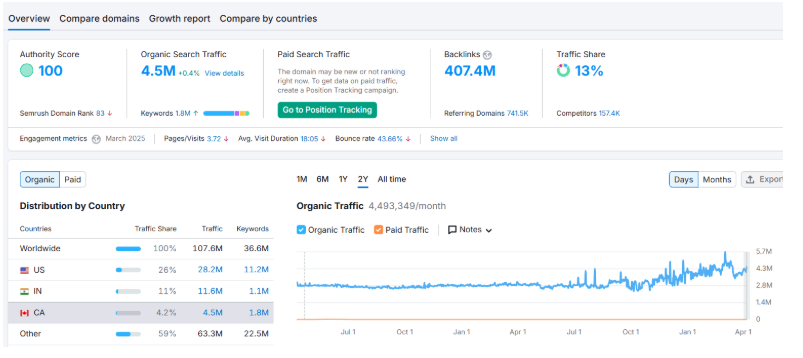
Technical SEO is essential for ensuring that search engines can crawl, index, and understand your website. Here are some top tools for technical SEO optimization that can help businesses improve digital marketing in Montreal strategies:
- Screaming FrogScreaming Frog is an essential tool for technical SEO audits. It crawls your website, providing detailed insights on broken links, duplicate content, missing tags, redirect issues, and other important SEO elements. It’s great for identifying on-site issues that could affect rankings.
- Google Search ConsoleGoogle Search Console is a free tool provided by Google, offering valuable insights into how your site performs in Google Search. It helps identify crawl errors, indexing issues, keyword performance, and any penalties that may be affecting your site’s visibility.
- Google PageSpeed InsightsPageSpeed Insights is critical for analyzing your website’s loading speed and overall performance. Site speed is now an important ranking factor, and improving it can help boost your site’s SEO. This tool provides suggestions for improving loading times and mobile-friendliness.
- GTmetrixGTmetrix is another tool that helps with website speed testing. It offers detailed performance reports and provides specific recommendations for improving page load times, such as optimizing images and reducing JavaScript.
- DeepCrawlDeepCrawl is a cloud-based crawling tool designed for large websites. It performs deep audits, offering insights into technical SEO issues like crawl errors, page speed, broken links, and more. DeepCrawl helps uncover problems that affect site performance on a large scale.
- Ahrefs Site AuditIn addition to its backlink analysis, Ahrefs also offers a site audit feature that scans your website for technical SEO issues. It looks for issues related to internal linking, page speed, content quality, duplicate content, and more.
- SEMrush Site AuditSEMrush also provides a comprehensive site audit tool that analyzes your website’s health. It helps identify errors and optimization opportunities in areas like metadata, broken links, page speed, and mobile-friendliness, which are crucial for enhancing digital marketing in Montreal strategies.
- Yoast SEO for Technical SEOWhile Yoast SEO is often used for content optimization, it also provides useful technical SEO features. Yoast’s features for XML sitemaps, breadcrumbs, and canonical URLs help improve site structure and ensure optimal crawling and indexing by search engines.
- Bing Webmaster ToolsAlthough most people focus on Google, Bing Webmaster Tools is an essential SEO tool, especially for sites that aim to target multiple search engines. It offers insights similar to Google Search Console but tailored for Bing’s algorithm.
- Schema.org and Structured Data Testing ToolUsing schema markup helps search engines understand the content of your pages more clearly. Structured data improves visibility in rich snippets and other enhanced search results. The Structured Data Testing Tool from Google can help validate your structured data and ensure it’s set up correctly.
10 Proven Advanced Strategies to Boost Your SEO
When it comes to SEO, understanding what is SEO strategy and employing advanced techniques can help you stand out from the competition and drive targeted traffic to your website. Below are 10 unique and proven methods that go beyond the basics, incorporating data-driven approaches and expert-level insights.
1. Leverage the Power of Topic Clusters and Pillar Pages
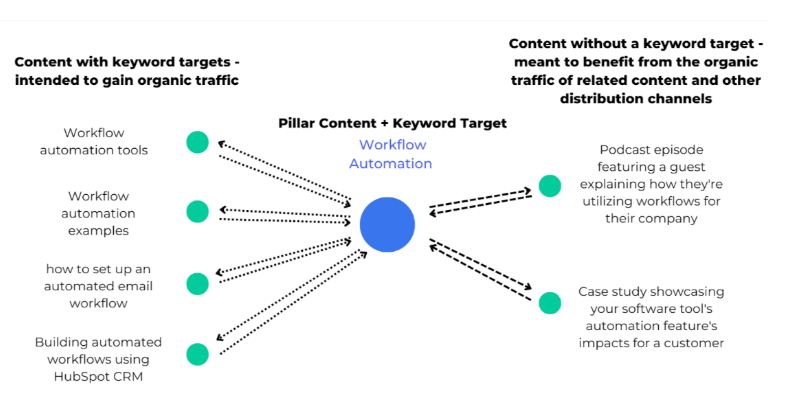
Rather than focusing on individual keywords, build topic clusters around core themes to enhance your website’s authority. Google’s algorithm values content that shows expertise, authority, and trust (E-A-T). Topic clusters help organize your content around a central “pillar” page, linking related blog posts or articles as “cluster” content. HubSpot reports that websites with pillar pages experience a 20% increase in organic traffic due to more comprehensive and organized content. This method improves internal linking and boosts your site’s relevance on specific topics.
2. Optimize for Featured Snippets
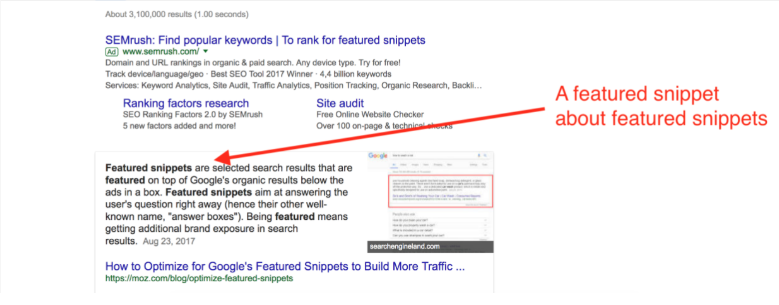
Featured Snippets provide immediate visibility at the top of search results, improving click-through rates (CTR). To optimize for snippets, aim to provide concise, well-organized answers to common questions in your niche. Implement structured data, use bullet points, tables, and direct answers in your content to increase your chances of appearing in these prime positions.
3. Content Gap Analysis with Competitor Keyword Research
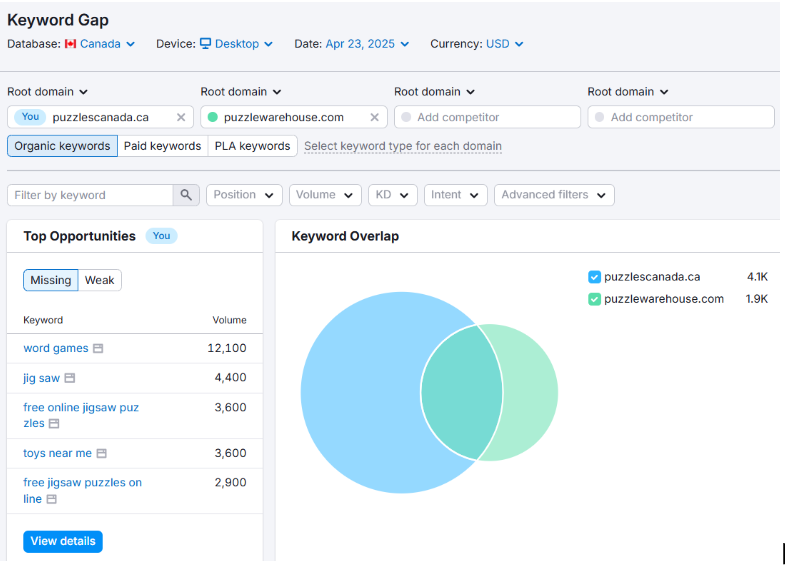
Ahrefs found that websites that focus on filling content gaps can see up to a 55% increase in organic search traffic within six months. Instead of focusing solely on your content, analyze what your competitors are ranking for and identify content gaps. Tools like SEMrush and Ahrefs provide insights into keywords your competitors are targeting, but you are missing. Working with an SEO expert in Montreal, filling these gaps with high-quality, in-depth content, you can gain an advantage in search rankings.
4. Optimize Core Web Vitals for Improved User Experience
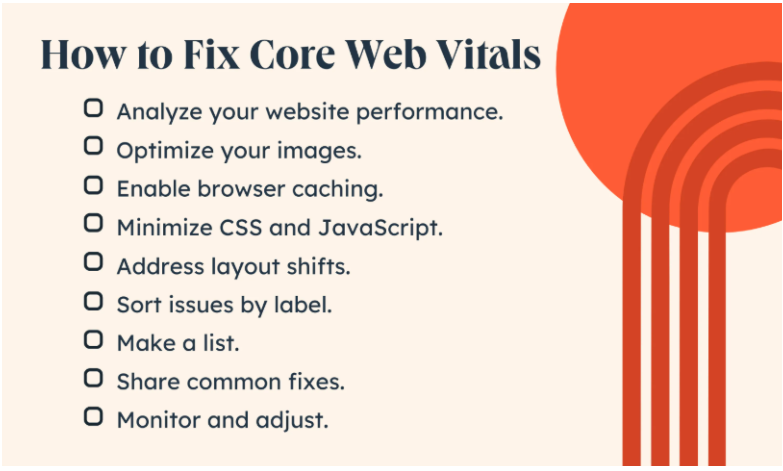
Google’s Core Web Vitals (LCP, FID, and CLS) are now key ranking factors. These metrics measure the real-world user experience, and sites that provide better performance are rewarded with higher rankings. Tools like Google PageSpeed Insights, GTmetrix, and Lighthouse can help you identify and optimize these metrics.
5. Voice Search Optimization

Voice search queries are growing rapidly, with an estimated 50% of all searches expected to be voice-based by 2026. Optimize your content for natural language and long-tail keywords that mirror how people speak. Using structured data to enhance your content’s visibility in voice search results is also crucial.
6. Focus on User Engagement Metrics (Dwell Time, Bounce Rate)

Google uses user engagement metrics such as dwell time and bounce rate as indirect ranking signals. According to a study by Search Engine Journal, content that encourages deeper engagement and interaction reduces bounce rate by 10-15%. By improving the quality of your content and user experience, you can reduce bounce rates and increase dwell time. Implementing interactive content, such as quizzes, polls, and engaging multimedia, can keep visitors on your page longer.
7. Semantic Search Optimization with Latent Semantic Indexing (LSI)

LSI helps Google understand the context and relevance of your content beyond exact match keywords. By using related terms and phrases, you can improve your content’s semantic relevance and ensure it matches search intent. Clearscope reports that articles optimized with LSI keywords have up to 50% better chances of ranking for multiple related terms and achieving higher organic traffic, making LSI a crucial technique for digital marketing in Montreal to drive better results.
8. Earning Links Through Digital PR

Link-building through traditional outreach can be time-consuming. Instead, focus on digital PR—pitching your content to journalists and influencers. Tools like HARO (Help A Reporter Out) can help you get featured in authoritative publications, earning valuable backlinks.
9. Mobile-First Indexing and Mobile SEO Optimization

Google found that over 50% of global search traffic now comes from mobile devices, making mobile-first indexing essential for SEO success. Google now uses mobile-first indexing, meaning it primarily uses the mobile version of your site for ranking and indexing. Ensure your website is responsive, fast, and optimized for mobile devices. With mobile traffic continuing to rise, optimizing for mobile search is non-negotiable. An SEO company in Montreal can help you tailor your website’s mobile experience to meet Google’s mobile-first indexing requirements and stay ahead in local and global rankings.
10. Build a Comprehensive Internal Linking Structure

Internal linking is an often-overlooked but powerful SEO strategy. A well-structured internal linking system not only helps users navigate your site more effectively but also distributes link equity across your pages. A study by Ahrefs revealed that pages with a strong internal linking strategy are 3.5 times more likely to rank higher for competitive keywords than those without. Ensure your cornerstone content is well-linked to help search engines prioritize the most important pages.
SEO Trends to Watch in 2025
With Google’s algorithm becoming increasingly sophisticated and user intent taking centre stage, 2025 is set to rewrite the rules of search optimization. If you want to rank high and stay relevant, you need to move beyond the basics and align with where SEO is headed, not where it’s been. To stay ahead of the curve, partnering with an SEO company in Montreal can provide the expertise and local insights necessary to leverage these evolving trends and ensure that your business remains competitive in the digital landscape. To truly understand how to evolve your strategy, it’s important to ask: how does SEO work in today’s dynamic digital environment?
Below are the key SEO trends dominating 2025 that every digital marketer, business owner, and SEO strategist must know:
1. Google’s SGE (Search Generative Experience) Takes Over

AI is now at the forefront of search. Google’s SGE is changing how results are displayed by offering AI-generated snapshots at the top of SERPS. This means:
- Websites must now optimize for conversational search queries.
- Contextual relevance matters more than ever.
- Content should answer follow-up questions proactively to show up in AI summaries.
2. Experience, Expertise, Authority & Trust (E-E-A-T) Becomes Non-Negotiable

Google continues to prioritize trustworthy, user-first content. The E-E-A-T framework is no longer just for health or finance—it applies across all industries. To boost E-E-A-T:
- Show real author credentials.
- Add case studies, testimonials, and external citations.
- Use clear, verifiable data and stay away from vague or clickbait content.
3. Topical Authority Crushes Keyword Stuffing

In 2025, Google rewards depth. Instead of isolated keyword-targeted pages, the algorithm prefers websites that fully cover a topic cluster. To win:
- Build interconnected content hubs around core topics.
- Link relevant blogs internally.
- Target semantic keywords to build context.
4. Visual Search and Voice Search Go Mainstream

With tools like Google Lens and smart speakers, non-text search is exploding. Your SEO strategy must now include:
- Descriptive image alt text and structured data.
- Natural language queries to optimize for voice search.
- FAQS and conversational content for smart speaker answers.
Conclusion: Turn SEO Into Your Business Growth Engine

SEO isn’t just a marketing tactic — it’s a long-term growth strategy that amplifies your brand’s visibility, builds trust with your audience, and drives consistent, high-converting traffic. From mastering Core Web Vitals and leveraging LSI keywords to optimizing your crawl budget and executing high-impact off-page strategies, SEO is your ultimate digital asset.
But strategy without execution leads nowhere. That’s where OptiWeb Marketing comes in. As a leading SEO company in Montreal, OptiWeb Marketing specializes in advanced SEO solutions tailored to help your business outrank competitors and dominate search results. Whether you’re aiming for local dominance or global reach, our expert team ensures our SEO strategy delivers real, measurable results to your website.
Now that you have this complete SEO guide, it’s time to audit your current performance, identify the gaps, and implement proven techniques. And if you’re ready to take things up a notch, partner with OptiWeb Marketing and turn your online presence into a powerful growth engine.
Because in the world of SEO, it’s not just about ranking — it’s about leading.
Also Read: Top AI SEO Tools in 2025 You Must Know
